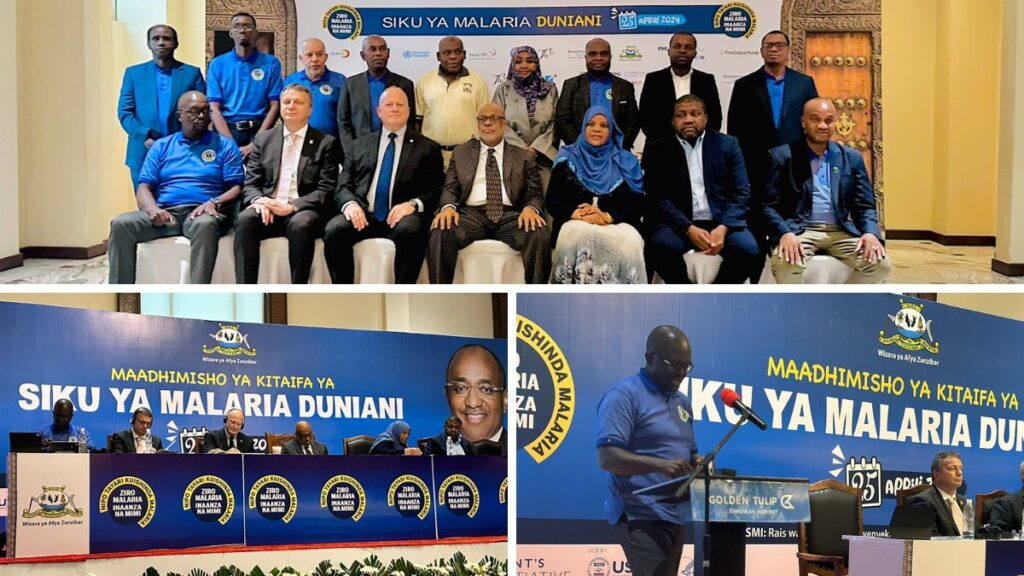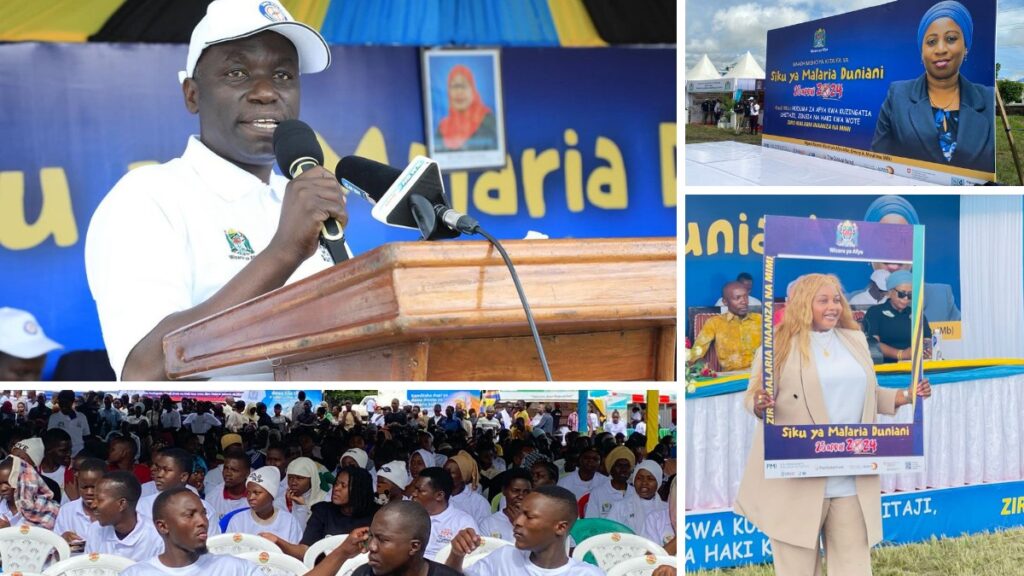World Malaria Day galvanises continental efforts to eliminate malaria through the Yaounde Declaration commitments
Published: Dar Es Salaam, 26 April 2024
African countries rally during commemorations, highlighting multiple initiatives to translate commitments into action and accelerate malaria elimination.
On World Malaria Day, the fight against malaria received a boost across the continent with celebrations featuring high-level participation from health ministers and country leadership, implementing key initiatives aimed at translating the Yaounde Declaration commitments into action – to end malaria once and for all in a continent most burdened by the disease.
Regional highlights of malaria elimination efforts
A highlight of this year’s World Malaria Day celebration was in Zanzibar, where the Honourable Minister for Health, Nassor Mazrui, unveiled the Zanzibar Malaria Elimination Council. This multi-sectoral platform brings together leaders from the public and private sectors, along with civil society, to champion malaria control and elimination in Zanzibar. Recently appointed by His Excellency Dr. Hussein A. Mwinyi, President of the Government of Zanzibar, the council will support advocacy, action, accountability, and resource mobilization efforts to address Zanzibar’s pressing malaria priorities.
Zanzibar’s current progress inspires hope in us all that with the existing tools in our malaria toolbox, and with a promising pipeline ahead, a malaria-free Africa is within reach. ALMA remains dedicated to supporting and learning from such exemplary efforts in the fight against malaria. As we celebrate with the people of Zanzibar the launch of the elimination council, I urge us to remain steadfast in our collective mission to rid the continent of malaria, thereby improving the lives of all our citizens.
Joy Phumaphi, Executive Secretary of ALMA

The Zanzibar Malaria Elimination Council poses for a photo with Honourable Minister for Health, senior ministry of health officials and development partners and ALMA Special Ambassador Anthony Okara delivers remarks from the ALMA Chair (His Excellency Umaro Sissoco Embaló) and ALMA Executive Secretary (Joy Phumaphi).
In Kenya, the Honourable Minister for Health, Susan Nakhumicha launched a Social-Behaviour Change Campaign, spearheaded by the End Malaria Council Kenya, which included roadshows and community outreach by the Malaria Youth Corps.
In the neighbouring United Republic of Tanzania, the Deputy Honourable Minister for Health, Dr. Godwin Mollel, presided over the World Malaria Day celebration held in Tabora, emphasizing cross-sectoral collaboration to reach the 2030 elimination targets. These efforts will be led by the Office of the Prime Minister, a member of the Tanzania EMC, through the Malaria Multi-sectoral Framework.

World Malaria Day celebration held in Tabora.
In other countries, including Zambia, Eswatini, South Sudan, Uganda, Nigeria, and Mozambique, many partners, including the End Malaria Councils and Malaria Youth Corps, collaborated with Ministries of Health to commemorate World Malaria Day through in-country community and stakeholder-driven events. In Uganda, for example, the youth led the Parliamentary Forum on a Malaria Walk before proceeding with community engagement.
Continental response and commitment
Simultaneously, at a continental level, the Africa CDC rallied partners across the continent to commit to the Catalytic Framework to end AIDS, TB, and eliminate malaria in Africa by 2030. All these efforts align with and support the commitments from the Yaounde Declaration.
Translating the commitments of the Yaounde Declaration into action, as seen on World Malaria Day, will help lift Africa out of the center of the perfect storm that threatens to disrupt essential life-saving malaria services. These challenges include critical financial shortfalls for malaria programmes, linked to the ongoing global financial crisis, the impacts of climate change, insecticide and drug resistance, and humanitarian crises that need urgent addressing to prevent malaria upsurges. As a result, the continent is off track to meet its bold and ambitious targets to end malaria and still bears the heaviest burden of the disease. Approximately 94% of all global malaria cases (233 million cases) and 95% of all malaria deaths (580,000 deaths) occur on the continent.
To reduce these alarming statistics of malaria deaths, it is inspiring that this World Malaria Day has also seen over 1,500 delegates converge in Rwanda for the Pan-African Malaria Conference (also known as the MIM conference), which also welcomed the Yaounde Declaration. The conference brought together global experts to discuss the latest achievements, research, and innovations in malaria prevention and treatment. The delegates used the MIM Conference to share perspectives that strengthen efforts towards locally driven research and development (R&D) and grassroots mobilisation to end malaria through innovation, collaboration, and synergy among stakeholders. The forum underscored the role of political leaders in grassroots mobilisation to end malaria under the theme ‘Invest, Innovate, Integrate.’ Key partners, including the Africa CDC, committed to scaling up and strengthening the community health workers’ cadre, surveillance, and local production of malaria commodities.
ALMA’s ongoing support and advocacy
ALMA welcomes the commitments to the Yaounde Declaration, highlighting our role in expanding the ‘Zero Malaria Starts with Me’ movement. This includes the establishment of End Malaria Councils and Funds to drive multisectoral action and domestic resource mobilisation, the establishment of youth champions, and regional collaboration to end the disease. Additionally, the adoption of scorecards as tools to monitor progress and spearhead critical actions to address bottlenecks in delivering essential malaria services has been pivotal. In the same spirit, ALMA will continue to support countries in translating these commitments into action. Currently, 30 countries have launched ‘Zero Malaria Starts with Me’ campaigns, eight have operational End Malaria and NTD councils and funds, and seven are in the process of being established. These councils have mobilised USD $52M while keeping malaria high on the political and development agenda. Seven countries have established youth corps.
In recognition of this year’s World Malaria Day theme – Gender, Health Equity, and Human Rights – ALMA joins the global health community in calling for the prioritisation of improved outcomes for women and girls. By applying a gender lens, we should aim to ensure that this demographic overcomes all barriers to accessing health services. The right to access health services when needed, without incurring financial hardship, is a fundamental human right that must be upheld. Ending malaria is achievable if we all commit to the rallying call ‘Zero Malaria Starts With Me.